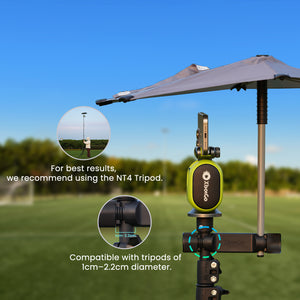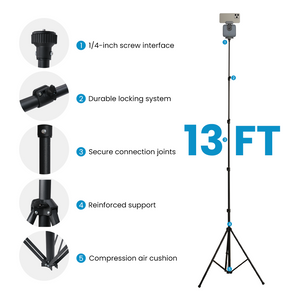XbotGo Chameleon AI Sports Camera
National Signing Day 2026: Essential Overview
Dreams become reality on February 4, 2026. That's when thousands of high school football players across America will officially sign their commitments to college programs, marking one of the most significant days in college football recruiting. National Signing Day 2026 isn't just about signatures on paper—it's about young athletes taking the first official step toward their college football dreams.
What is National Signing Day and When Does it Happen?
National Signing Day 2026 falls on Wednesday, February 4, 2026, maintaining the tradition of occurring on the first Wednesday of February. This date represents the opening of the regular signing period for college football recruits, though it's no longer the only opportunity for players to make their commitments official.
The landscape has shifted dramatically with the introduction of the early signing period in December. Most elite recruits now sign during this earlier window, leaving February's National Signing Day for late bloomers, undecided prospects, and those who missed the December deadline. Despite this change, the February date remains culturally significant and generates substantial excitement among fans and media alike.

XbotGo Chameleon AI Sports Cameraman
Capture every moment with AI-powered tracking. Perfect for parents, coaches, athletes, and creators who want seamless footage without manual filming.
Major Changes Affecting the 2026 Class
The End of the National Letter of Intent
Perhaps the most significant change for the 2026 class is the NCAA's elimination of the traditional National Letter of Intent (NLI). Starting with the 2025 class and continuing through 2026, student-athletes will sign NCAA financial aid agreements instead. While this administrative change might seem minor, it represents a fundamental shift in how commitments are formalized after 60 years of the NLI system.
Conference Realignment's Recruiting Impact
The 2026 recruiting class is the first to be recruited entirely in the post-major realignment era. USC and UCLA now compete in the Big Ten, while Texas and Oklahoma have joined the SEC. These seismic shifts have completely redrawn recruiting territories:
- Big Ten schools actively recruit California talent
- SEC programs leverage expanded presence in Texas
- Traditional regional boundaries have essentially disappeared
Understanding the Current 2026 Recruiting Landscape
Top Programs Setting the Pace
As of late 2024, several programs have established themselves as early leaders in the 2026 recruiting race:
USC Trojans currently lead most recruiting rankings, successfully leveraging their combination of California talent access and national appeal. Their ability to land multiple five-star commits demonstrates effective adaptation to the new recruiting environment.
Ohio State Buckeyes maintain their position as a perennial recruiting powerhouse, particularly excelling at wide receiver recruiting. The commitment of elite prospects like Chris Henry Jr. showcases their continued ability to attract top talent at skill positions.
Penn State Nittany Lions have climbed rankings through strategic in-state recruiting combined with selective national targets, proving that development-focused programs can compete effectively with traditional powers.
The NIL Revolution
Name, Image, and Likeness (NIL) deals have fundamentally transformed recruiting conversations. Unlike previous generations where playing time and NFL development dominated discussions, 2026 recruits and their families now evaluate complex financial packages. Programs with strong alumni networks and business communities hold significant advantages, though creative smaller-market schools are finding innovative ways to compete.
What Makes the 2026 Class Special
Elite Quarterback Talent
The 2026 class features exceptional quarterback depth, with five-star prospects like Jared Curtis (Georgia commit) and Dia Bell (Texas commit) headlining the position. These signal-callers represent the next generation of college football stars, with programs investing heavily in their recruitment and development.
Position-Specific Trends
Wide receivers continue to gravitate toward established "factory" programs like Ohio State, where the track record of NFL development creates a self-perpetuating cycle of elite recruitment. Meanwhile, offensive line recruiting has intensified as programs recognize the position's critical importance in modern college football.
The Family Experience: Beyond the Rankings
Managing Modern Recruiting Pressures
Families navigating the 2026 recruiting process face unprecedented complexity. Between early commitments, NIL negotiations, and transfer portal considerations, the journey to National Signing Day requires careful planning and realistic expectations.
Key considerations for families include:
- Long-term stability of coaching staffs
- Academic fit beyond athletic opportunities
- Personal relationships with coaches and programs
- Financial implications of various offers
Celebrating the Moment
Despite the business aspects, National Signing Day remains deeply personal. High schools organize elaborate ceremonies, families host celebrations, and communities rally around their local stars. For many families, this day represents the culmination of years of sacrifice, travel, and investment in their young athlete's dreams.
Modern technology allows families to share these moments more broadly than ever before. AI-powered cameras can automatically capture signing ceremonies, allowing parents to be fully present rather than worrying about recording the moment. These memories—the nervous smiles, proud tears, and celebratory embraces—become treasured family keepsakes.
Fan Perspectives and Realistic Expectations
The Evolution of Fan Engagement
Today's college football fans approach recruiting with more sophistication and, notably, more skepticism than previous generations. The combination of early decommitments and transfer portal activity has created a "wait and see" mentality among even the most passionate supporters.
As one Georgia fan noted about a five-star commitment: "I've learned not to get excited until I see them on the field." This pragmatic approach reflects the reality that recruiting success doesn't always translate to on-field performance, and even signed recruits might transfer before making an impact.
Development Over Star Rankings
Programs like Penn State have built successful models focusing on player development rather than accumulating the highest-rated classes. Their fans have embraced this identity, recognizing that three-star recruits who fit the system and stay for four years often contribute more than five-star talents who transfer after one season.
Looking Ahead: What to Expect on February 4, 2026
National Signing Day 2026 will feature all the pageantry fans have come to expect:
- Live-streamed announcements from top recruits
- Social media reveals and surprise flips
- ESPN and other networks providing wall-to-wall coverage
- Local news crews at high school signing ceremonies
However, the day will likely feel different from signing days of the past. With most elite prospects already signed in December, February's event focuses more on hidden gems, late developers, and compelling individual stories rather than shocking announcements from five-star recruits.
The Bigger Picture
National Signing Day 2026 represents more than recruiting rankings and highlight reels. It symbolizes opportunity, hope, and the continuation of college football's rich traditions in an evolving landscape. These young athletes aren't just joining football programs—they're becoming part of communities, academic institutions, and legacies that will shape their lives far beyond their playing days.
As February 4, 2026 approaches, remember that behind every signing ceremony is a unique story of dedication, perseverance, and dreams pursued. Whether your favorite team lands a five-star quarterback or discovers an overlooked gem, National Signing Day reminds us why college football recruiting captivates millions: it's where potential meets opportunity, and where the future of the sport begins to take shape.
XbotGo Chameleon AI Sports Camera
Capture every moment with AI-powered tracking. Perfect for coaches, parents, and athletes who want seamless footage without manual filming.








 Soccer
Soccer Basketball
Basketball Ice Hockey
Ice Hockey Football
Football Handball
Handball
























